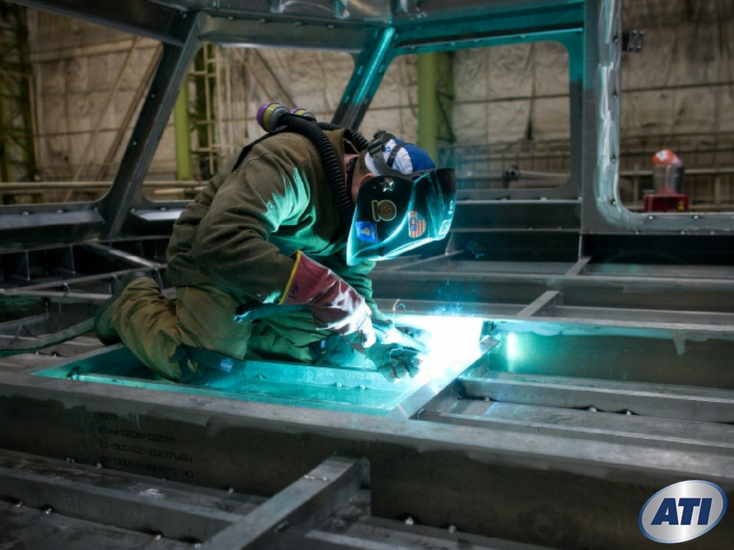Welding Certifications Requirements for Shipyards

Shipyards throughout the United States are on the lookout for welders to contribute to the construction and maintenance of the nation’s enormous fleet of military and commercial ships. It is a physically and mentally challenging occupation that requires attention to detail, stamina, and a high degree of technical skill. The importance of prior training cannot be understated, as this is a competitive job field where success can be determined by current welding certification requirements.
Why So Many Welding Certification Requirements?
Maritime Welding positions require a vast array of certifications before a welder can first fire up their equipment. These certifications are necessary for a variety of reasons, ranging from safety considerations to quality of work concerns. There is a great deal of regulation in the maritime sector and the transportation logistics industry in general that govern how work is conducted.
Failure to be aware of how to keep your daily work up to code can not only result in fines or other penalties but can also endanger both workers and those who depend upon the structural integrity of vessels that they work on every day.
How Do I Get Certified?
The first step in the certification process is to enroll in a welding diploma program, where you will begin to build the skill base that will be required when the time comes to enter the certification process. Welding technology certifications require operation of potentially hazardous equipment and required strict adherence to procedures and high standards for work produced.
For the most basic of certifications, you can expect to perform a welding task that will be vigorously inspected and tested while your every procedural step is assessed according to the specifications outlined in the certification documentation. While you may be allowed multiple opportunities to achieve the standards, prior study and preparation are key to success.
Available Certifications From The AWS
One of the leading sources of the welding certifications needed for employment in the maritime welding field is the AWS (American Welding Society). Typical unified certificates include the Certified Welder and Certified Welding Fabricator programs. These can be attained while attending a formal welding program and include the following certificates:
- SMAW Tack Welder Qualification – AWS D1.1 Structural Welding Code
- Steel SMAW 6G Pipe Certification – AWS D1.1 Structural Welding Code
- Steel SMAW All Position Plate Certification Limited – AWS D1.1 Structural Welding Code
- Steel FCAW All Position Plate Certification, Limited – AWS D1.1 Structural Welding Code
- Steel GTAW All Position Plate Certification, Limited – AWS D1.1 Structural Welding Code, Steel
Completing most or all of these essential certifications is highly recommend before first seeking employment as a maritime welder. An employer may be reluctant to take on uncertified employees and it can be difficult to attain an entry-level position in this competitive career field.
Safety First
While current welding certification requirements are the biggest hurdle to a welder starting a new job in maritime welding, there are certain training requirements through OSHA (Occupational Safety and Health Administration) that must be satisfied in order to work in this challenging occupation. The shipyard environment presents special challenges and potential hazards that employees need to be aware of. Any potential welder should study and understand the guidelines outlined in OSHAs Shipyard Industry Standards before beginning any on the job training, regardless of how much welding experience or certification that they have.
ATI Welding Program Is Custom-Designed for Maritime Welders
ATI offers a comprehensive maritime welding program that covers the practical application of welding technology in a wide variety of occupational tasks including:
- Welding procedures and safety
- Repair of steel structures
- Installation of piping
- Waterproofing of structures
- Cutting/scrapping of equipment
The program includes both in-classroom demonstrations and laboratory work as well as hands-on practical experience with welding tools. Demonstration of proficiency and awareness of safety codes and procedures is a requirement for graduation. Completion of this program satisfies many of the training requirements for an entry-level position in the maritime welding industry.
Are you ready to start an exciting new career in maritime welding today? Contact our helpful admissions staff at ATI today for more information on these programs.
Industry Knowledge
Welcome to the Advanced Technology Institute's Blog, your resource for industry insights and discussions on technologies shaping the future of automotive, heavy vehicle, hvac, welding, and other related career paths.
Explore how ATI's curriculum and hands-on learning opportunities can propel your career in the tech-driven world.
%20(1).jpg)
%20(1).jpg)
%20(1).jpg)